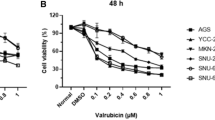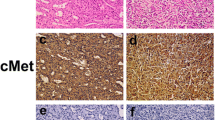Abstract
To investigate the anti-proliferative and chemosensitizing effects of luteolin on human gastric cancer, gastric cancer AGS cells were treated with luteolin and/or other chemotherapeutic agents. Cell growth was assessed by MTT assay, cell cycle and apoptosis were assessed by flow-cytometric analysis, and the expression of major proteins regulating cell cycle and apoptosis was also detected. The results showed that luteolin inhibited the growth of gastric cancer cells in a dose- and time-dependent manner. Flow cytometry revealed that the percentage of cells at G2/M phase increased dose-dependently. The protein levels of Cdc2, Cyclin B1 and Cdc25C were reduced and p21/cip1 was up-regulated after the treatment with luteolin. Furthermore, luteolin induced apoptosis in gastric cancer AGS cells. Western blotting showed that luteolin treatment significantly increased the levels of pro-apoptotic proteins, including Caspase-3, 6, 9, Bax, and p53, and decreased the levels of anti-apoptotic protein Bcl-2, thus shifting the Bax/Bcl ratio in favor of apoptosis. It was also demonstrated that a combinational treatment of cisplatin and luteolin induced more effectively cell growth inhibition, compared to cisplatin treatment alone. These findings indicate the anti-proliferative and chemosensitizing effects of luteolin on human gastric cancer AGS cells and luteolin may be a promising candidate agent used in the treatment of gastric cancer.






Similar content being viewed by others
References
Alberts SR, Cervantes A, van de Velde CJ (2003) Gastric cancer: epidemiology, pathology and treatment. Ann Oncol 14(Suppl 2):ii31–ii36
Crew KD, Neugut AI (2006) Epidemiology of gastric cancer. World J Gastroenterol 12:354–362
Wainess RM, Dimick JB, Upchurch GR Jr et al (2003) Epidemiology of surgically treated gastric cancer in the United States, 1988–2000. J Gastrointest Surg 7:879–883
Hundahl SA, Menck HR, Mansour EG et al (1997) The national cancer data base report on gastric carcinoma. Cancer 80:2333–2341
Ajani JA (2005) Evolving chemotherapy for advanced gastric cancer. Oncologist 10(Suppl 3):49–58
Amic D, Davidovic-Amic D, Beslo D et al (2007) SAR and QSAR of the antioxidant activity of flavonoids. Curr Med Chem 14:827–845
Gonzalez-Gallego J, Sanchez-Campos S, Tunon MJ (2007) Anti-inflammatory properties of dietary flavonoids. Nutr Hosp 22:287–293
Li Y, Fang H, Xu W (2007) Recent advance in the research of flavonoids as anticancer agents. Mini Rev Med Chem 7:663–678
Ozcelik B, Orhan I, Toker G (2006) Antiviral and antimicrobial assessment of some selected flavonoids. Z Naturforsch [C] 61:632–638
Zhang FF, Shen HM, Zhu XQ (2006) Research progress on anti-tumor effects of luteolin. Zhejiang Da Xue Xue Bao Yi Xue Ban 35:573–578
Shi R, Huang Q, Zhu X et al (2007) Luteolin sensitizes the anticancer effect of cisplatin via c-Jun NH2-terminal kinase-mediated p53 phosphorylation and stabilization. Mol Cancer Ther 6:1338–1347
Chiu FL, Lin JK (2008) Downregulation of androgen receptor expression by luteolin causes inhibition of cell proliferation and induction of apoptosis in human prostate cancer cells and xenografts. Prostate 68:61–71
Lim do Y, Jeong Y, Tyner AL et al (2007) Induction of cell cycle arrest and apoptosis in HT-29 human colon cancer cells by the dietary compound luteolin. Am J Physiol Gastrointest Liver Physiol 292:G66–G75
Selvendiran K, Koga H, Ueno T et al (2006) Luteolin promotes degradation in signal transducer and activator of transcription 3 in human hepatoma cells: an implication for the antitumor potential of flavonoids. Cancer Res 66:4826–4834
Chou TC (2006) Theoretical basis, experimental design, and computerized simulation of synergism and antagonism in drug combination studies. Pharmacol Rev 58:621–681
Fujita T, Doihara H, Washio K et al (2007) Antitumor effects and drug interactions of the proteasome inhibitor bortezomib (PS341) in gastric cancer cells. Anticancer Drugs 18:677–686
Hermeking H, Benzinger A (2006) 14-3-3 proteins in cell cycle regulation. Semin Cancer Biol 16:183–192
Debatin KM (2004) Apoptosis pathways in cancer and cancer therapy. Cancer Immunol Immunother 53:153–159
Fisher DE (2001) Pathways of apoptosis and the modulation of cell death in cancer. Hematol Oncol Clin North Am 15:931–956, ix
Fulda S, Debatin KM (2004) Targeting apoptosis pathways in cancer therapy. Curr Cancer Drug Targets 4:569–576
Kobayashi T, Nakata T, Kuzumaki T (2002) Effect of flavonoids on cell cycle progression in prostate cancer cells. Cancer Lett 176:17–23
Chang J, Hsu Y, Kuo P et al (2005) Increase of Bax/Bcl-XL ratio and arrest of cell cycle by luteolin in immortalized human hepatoma cell line. Life Sci 76:1883–1893
Wang W, VanAlstyne PC, Irons KA et al (2004) Individual and interactive effects of apigenin analogs on G2/M cell-cycle arrest in human colon carcinoma cell lines. Nutr Cancer 48:106–114
Sherr CJ (1994) G1 phase progression: cycling on cue. Cell 79:551–555
Niculescu AB 3rd, Chen X, Smeets M et al (1998) Effects of p21(Cip1/Waf1) at both the G1/S and the G2/M cell cycle transitions: pRb is a critical determinant in blocking DNA replication and in preventing endoreduplication. Mol Cell Biol 18:629–643
Bunz F, Dutriaux A, Lengauer C et al (1998) Requirement for p53 and p21 to sustain G2 arrest after DNA damage. Science 282:1497–1501
Daniel PT, Schulze-Osthoff K, Belka C et al (2003) Guardians of cell death: the Bcl-2 family proteins. Essays Biochem 39:73–88
Srivastava M, Ahmad N, Gupta S et al (2001) Involvement of Bcl-2 and Bax in photodynamic therapy-mediated apoptosis. Antisense Bcl-2 oligonucleotide sensitizes RIF 1 cells to photodynamic therapy apoptosis. J Biol Chem 276:15481–15488
Shi Y (2006) Mechanical aspects of apoptosome assembly. Curr Opin Cell Biol 18:677–684
Bruzzese F, Di Gennaro E, Avallone A et al (2006) Synergistic antitumor activity of epidermal growth factor receptor tyrosine kinase inhibitor gefitinib and IFN-alpha in head and neck cancer cells in vitro and in vivo. Clin Cancer Res 12:617–625
Buzdar A, Howell A, Cuzick J et al (2006) Comprehensive side-effect profile of anastrozole and tamoxifen as adjuvant treatment for early-stage breast cancer: long-term safety analysis of the ATAC trial. Lancet Oncol 7:633–643
Author information
Authors and Affiliations
Corresponding author
Rights and permissions
About this article
Cite this article
Wu, B., Zhang, Q., Shen, W. et al. Anti-proliferative and chemosensitizing effects of luteolin on human gastric cancer AGS cell line. Mol Cell Biochem 313, 125–132 (2008). https://doi.org/10.1007/s11010-008-9749-x
Received:
Accepted:
Published:
Issue Date:
DOI: https://doi.org/10.1007/s11010-008-9749-x




